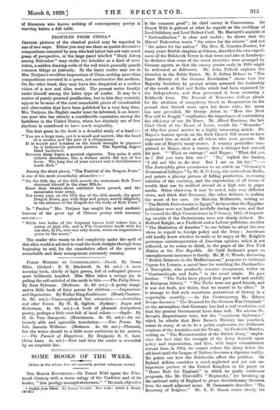PROFILES FROM CHINA.* , Cm:ram pictures of the classical period
may be regarded in one of two ways. Either you may see them as quaint decorative compositions executed by men who had talent but not very much grasp of perspective, or the huge panel labelled " Duck Asleep among Bulrushes " may strike the beholder as a kind of reve- lation, a sudden drawing aside of the veil which generally guards common things so jealously. So the hasty reader may see in
Mrs. Tietjens's veralibrea impressions of China nothing more than compositions executed in a queer, not unattractive flat medium.
On the other hand, they may leave him disquieted at a sudden vision of a new and alien world. The present writer frankly ranks himself among the latter type of reader. It may be a matter of purely personal predilection, but to him they certainly appear to be some of the most remarkable pieces of visualization and observation that have been published for a very long time. Mrs. Tietjens, the English reader must be informed, is an Ameri- can poet who has already a considerable reputation among the fastidious in the United States, where her scholarly use of free rhythms is considered to have much originality.
The first poem in the book is a dreadful study of a hand :-
" You are a large man, yet it is small and narrow, like the hand of a woman and the paw of a chimpanzee.
It is supple and boneless as the bands wrought in pigment by a fashionable portrait painter. The tapering fingers bend backward.
Between them burns a scented cigarette. You poise it with infinite daintiness, like a woman under the eye of her lover. The long line of your curved nail is fastidiousness made flesh."
Among the short pieces, "The Festival of the Dragon Boats" Is one of the most remarkably attractive :—
" On the fifth day of the fifth month the statesman Kuh Yuen drowned himself in the riser Mih-lo.
Since then twenty-three centuries have passed, and the mountains wear away.
Yet every year, on the fifth day of the fifth month, the great Dragon Boats, gay with flags and gongs, search diligently in the streams of the Empire for the body of Kuh Yuen."
In " Poetics " Mrs. Tietjens has caught the cruel sardonic humour of the great age of Chinese poetry with uncanny success :-
"While two ladies of the Imperial harem held before him a screen of pink silk, and a P'in Concubine knelt with his ink-slab, Li Po, who was very drunk, wrote an impassioned poem to the moon."
The reader who wants to feel completely under the spell of this alien world is advised to read the book straight through from beginning to end, for the cumulative effect of the poems is remarkable and their arrangement extremely cunning.










































 Previous page
Previous page